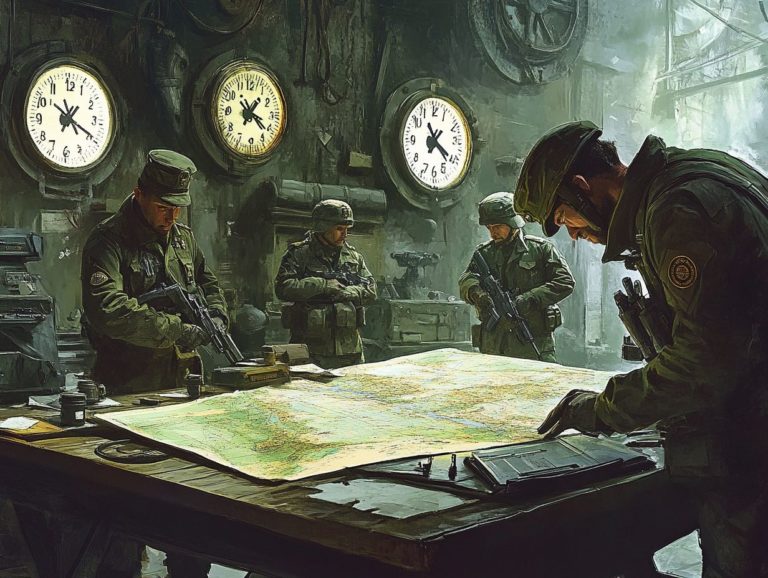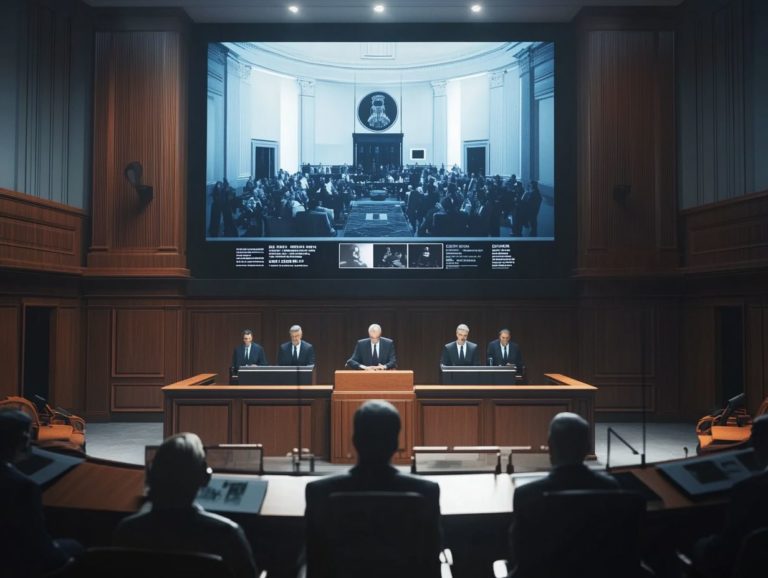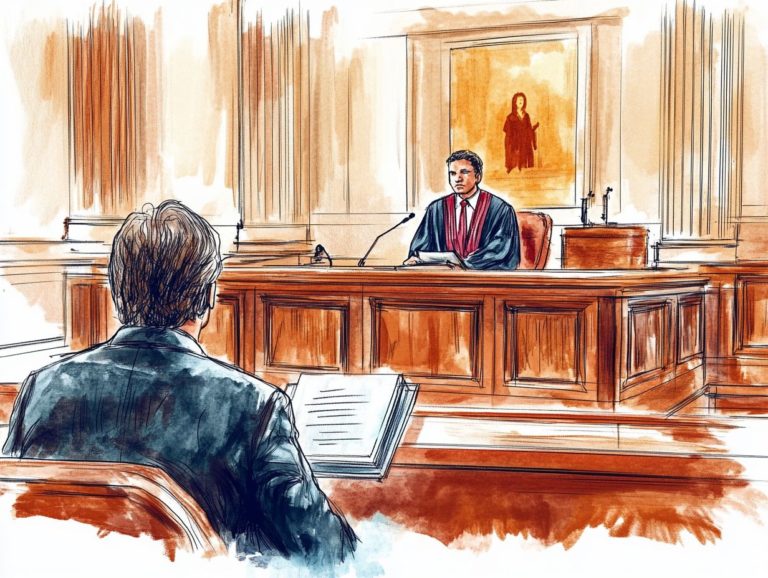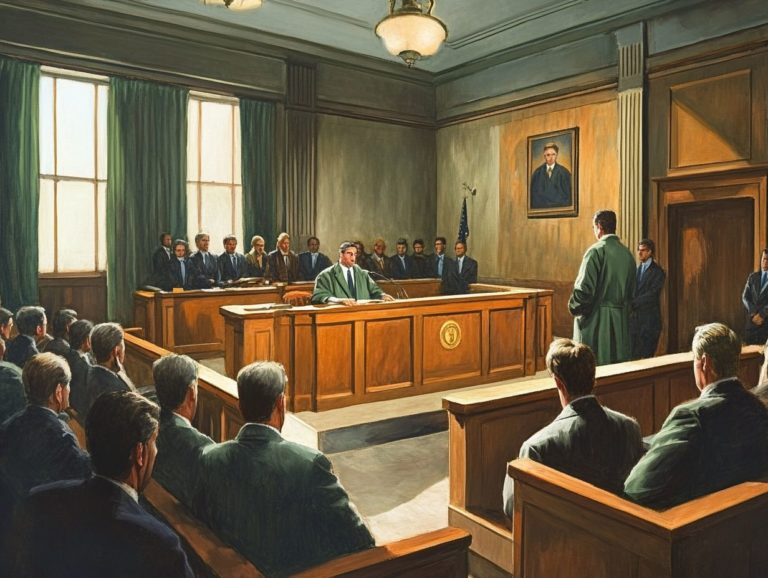The Role of Personal Narratives in Defense
Get ready to explore the fascinating role of personal narratives in defense!
Personal narratives are powerful tools that shape perspectives, especially in the field of defense.
This article examines the historical significance of personal narratives in past conflicts and the invaluable lessons they provide. You ll discover how these stories can sway public opinion and support military actions, underscoring their importance in modern defense strategies.
The discussion includes ethical considerations related to their use and looks ahead to future innovations that could enhance their impact.
Join us in exploring the profound role personal narratives play in the complex world of defense.
Contents
- Key Takeaways:
- Historical Examples of Personal Narratives in Defense
- The Power of Personal Narratives in Shaping Public Opinion
- Utilizing Personal Stories in Modern Defense Strategies
- The Ethical Considerations of Using Personal Stories
- Future Implications and Possibilities for Personal Narratives in Defense
- Frequently Asked Questions
- What is the role of personal narratives in defense?
- How do personal narratives impact the outcome of a defense case?
- Can personal narratives be used as evidence in a defense case?
- How important is it for a defense strategy to include personal narratives?
- What types of personal narratives can be used in a defense case?
- Are there any potential downsides to using personal narratives in defense?
Key Takeaways:

- Personal narratives shape public opinion and support defense efforts.
- We must consider the ethical implications to protect individuals and communities.
- Future strategies should incorporate personal narratives, exploring new technologies and approaches to engage the public effectively.
Defining Personal Narratives
Personal narratives are powerful tools that allow you to share your experiences, emotions, and struggles cohesively.
This process helps you understand how close or far you feel from tough experiences or major life events.
These stories reflect your journey and help us understand important human values, with empathy at the heart of narrative development.
In various contexts, such as trauma recovery, these narratives can assist you in reconstructing your identity by turning painful experiences into compelling stories of resilience.
For example, survivors of abuse often share their stories in support groups, fostering connection and normalizing their experiences, which promotes healing among peers.
In behavioral analysis, personal narratives offer professionals insights into your motivations and challenges, paving the way for more targeted interventions.
By engaging with these narratives, both you and your listeners develop a shared sense of meaning. This allows personal experiences to resonate collectively, ultimately enriching the broader tapestry of human experience.
Historical Examples of Personal Narratives in Defense
Throughout history, personal narratives have served as powerful tools for defense, especially in trauma recovery.
When individuals recount their experiences, such as Viktor Frankl’s profound reflections from Auschwitz during the Holocaust, they provide more than just documentation of history.
These narratives become vessels of healing and understanding, fostering connection and resilience within communities affected by conflict.
Lessons Learned from Past Conflicts
Lessons learned from past conflicts often emerge through personal stories that reveal the emotional intensity and challenges faced by individuals.
These narratives significantly inform your future approaches to conflict resolution and trauma recovery.
They shape your understanding of collective futures and highlight the essential role of empathy in the healing process.
For instance, when a veteran shares his journey through loss and resilience, it demonstrates how communities can cultivate dialogue and build support systems that foster healing.
The pain woven into these personal narratives emphasizes the importance of active listening and shows how vulnerability can create a bridge of understanding.
Recognizing the shared humanity in these stories nurtures empathy, encouraging you and others to adopt a collaborative approach to conflict resolution, paving the way for a more compassionate future.
The Power of Personal Narratives in Shaping Public Opinion
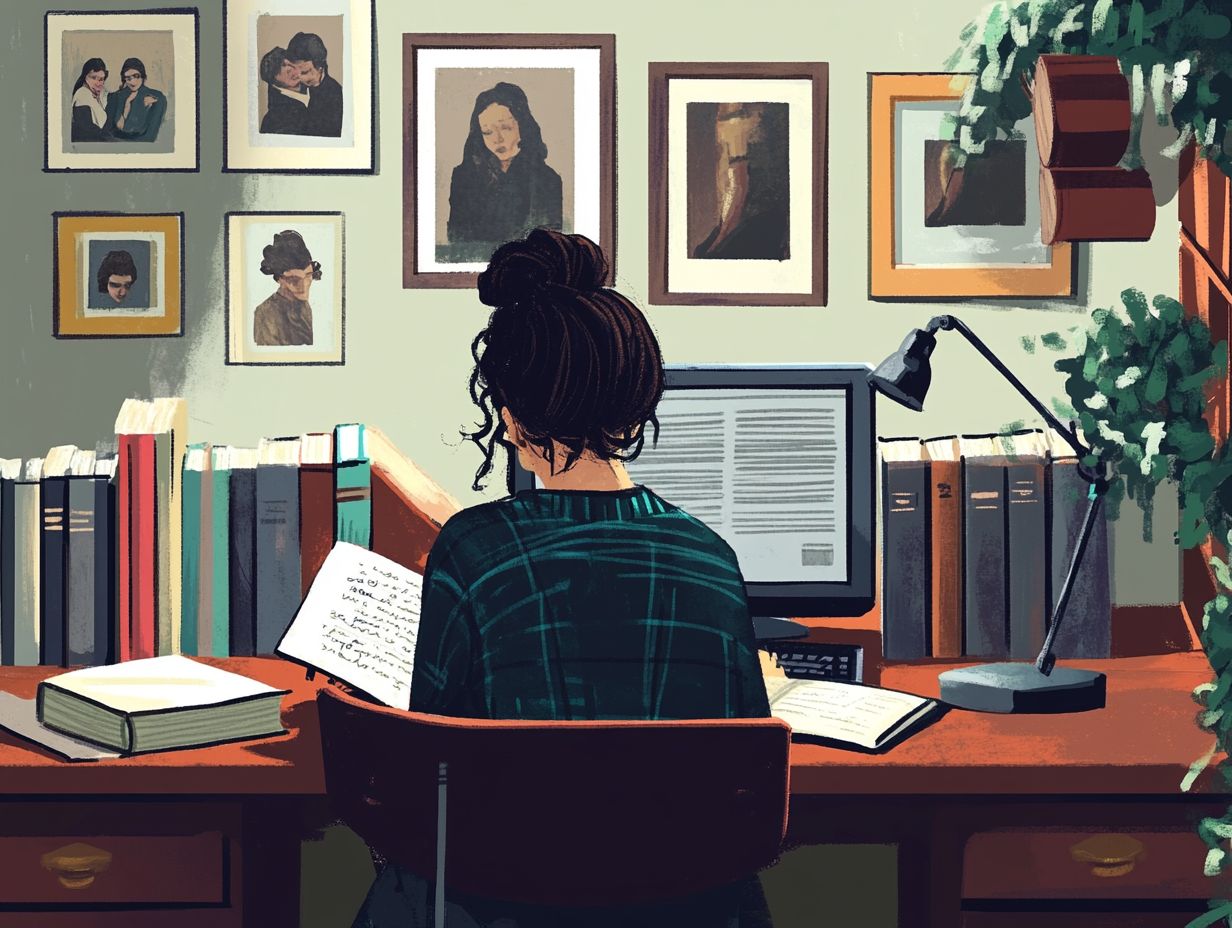
Personal narratives have a remarkable influence on shaping public opinion, as they encapsulate genuine struggles and cultivate empathy among audiences through compelling storytelling.
By focusing on individual experiences, these narratives resonate deeply with larger societal issues, encouraging meaningful dialogue and inspiring change.
What s your story? Share it with us!
Influencing Public Perception and Support
Influencing public perception and rallying support often relies on the emotional power of personal stories. These stories allow audiences to find meaning in individual experiences, shifting viewpoints and inspiring collective action a testament to their impact in advocacy.
These stories create strong bonds, evoking empathy and prompting reflection on shared human experiences. For instance, look at the narratives surrounding climate change; when individuals share their personal experiences about its impact on their communities, they ignite a sense of urgency in others.
A notable example is youth activists like Greta Thunberg. Her candid and passionate recounting of her experiences has energized millions.
By turning abstract ideas into personal stories, these narratives resonate deeply with people, reshaping public discourse and inspiring grassroots movements that elevate the call for urgent action.
Utilizing Personal Stories in Modern Defense Strategies
Today, modern defense strategies increasingly embrace personal stories, recognizing their potential in crafting clear narratives that connect with both individuals and broader audiences.
This strategy aligns with how people behave and react, emphasizing the crucial role of storytelling in enhancing psychological well-being and building resilience.
Examples of Incorporating Personal Narratives
Using personal stories enriches client experiences across various fields, adding emotional depth and healing tools that stem from these authentic accounts. This integration fosters deeper connections and understanding.
In healthcare, patient stories illuminate individual experiences with illness, presenting symptoms and treatments in ways that mere statistics cannot. This personal insight cultivates empathy among healthcare providers and strengthens the bond between patients and providers.
In education, students’ stories about their learning journeys inform teaching strategies. This enables a more personalized approach that caters to unique learning styles.
Advocacy groups also utilize these stories to create campaigns that resonate personally, effectively mobilizing support and engaging communities.
Ultimately, these real-life accounts are powerful tools that enhance overall experiences and foster meaningful emotional connections in diverse contexts.
The Ethical Considerations of Using Personal Stories

The ethical considerations surrounding the use of personal stories are crucial, as these narratives significantly impact individuals and communities, shaping emotional well-being and coherence.
Adopting a responsible approach to storytelling is vital, ensuring that these narratives serve constructive purposes and contribute positively to the broader conversation.
Impact on Individuals and Communities
The impact of personal stories on individuals and communities can be transformative, especially in trauma recovery. When shared stories come into play, they foster communal healing and understanding. These narratives act as powerful catalysts for change and resilience.
By allowing individuals to express their lived experiences, these accounts create deeper emotional connections and nurture empathy among listeners.
Consider community storytelling projects, particularly in post-conflict regions; they vividly illustrate how sharing stories can heal fractured societies. Research from organizations like The Moth shows that storytelling fortifies personal identity and strengthens social bonds, as individuals and their audiences discover common ground within diverse experiences.
In settings where trauma is prevalent, such as after natural disasters, storytelling initiatives have proven effective in aiding recovery. They empower individuals to articulate their feelings and find collective strength in vulnerability, reminding everyone that they are not alone in their journeys.
We encourage you to share your own stories or get involved in community storytelling projects. Your experiences could inspire others and create meaningful connections.
Future Implications and Possibilities for Personal Narratives in Defense
The future implications and possibilities for personal narratives in defense are truly expansive.
With emerging technologies and innovative approaches, you have the opportunity to capture and share authentic stories that resonate deeply with audiences.
These advancements can significantly enhance the effectiveness of your narratives in both advocacy and healing. They create opportunities for impactful connections and transformations.
Exploring New Approaches and Technologies
Exploring new approaches and technologies in personal narratives unveils their growing significance in storytelling and audience transformation. You’ll discover that these narratives can be shared and experienced in various formats, leading to deeper connections and enhanced understanding.
Innovative tools, such as augmented reality a way to blend digital information with the real world and interactive video platforms are revolutionizing the way you craft and present your stories. These mediums create a more immersive experience by placing user engagement and feedback at the forefront.
Personal experiences are becoming increasingly accessible. They nurture empathy and spark transformative dialogues, allowing you to see the world through another’s lens.
This interconnectedness has the potential to dismantle barriers, enabling a richer appreciation for diverse perspectives and experiences in our ever-evolving society.
Frequently Asked Questions

What is the role of personal narratives in defense?
Personal narratives in defense provide firsthand accounts of experiences, thoughts, and emotions related to specific events or situations. They can support or refute accusations, offer context, and humanize the defendant.
How do personal narratives impact the outcome of a defense case?
Personal narratives can significantly influence the outcome of a defense case. They help the jury or judge understand the defendant’s perspective and motivations, evoking empathy and emotional responses that may sway decisions.
Can personal narratives be used as evidence in a defense case?
Yes, personal narratives can be used as evidence in a defense case. However, they must be relevant and supported by other evidence or witness testimony. The narrator’s credibility and the consistency of their story are also considered.
How important is it for a defense strategy to include personal narratives?
In many cases, personal narratives are crucial components of a defense strategy. They provide unique perspectives and humanize the defendant, making them relatable to the jury or judge. However, their effectiveness depends on the case’s specific details and circumstances.
What types of personal narratives can be used in a defense case?
Various types of personal narratives can be used in a defense case, such as written statements, recorded interviews, or live testimony. It is essential for the defense team to select the most impactful and appropriate narrative type for the case.
Are there any potential downsides to using personal narratives in defense?
While personal narratives can be powerful tools in a defense case, potential downsides exist. The narrator’s credibility may come into question, and the defense team must avoid presenting biased or inconsistent narratives. Moreover, personal narratives may not always be admissible as evidence, so it’s vital to consult with legal counsel before including them in a defense strategy.
Consider how personal narratives can shape your understanding or approach in various situations. Share your own stories or reflections!



